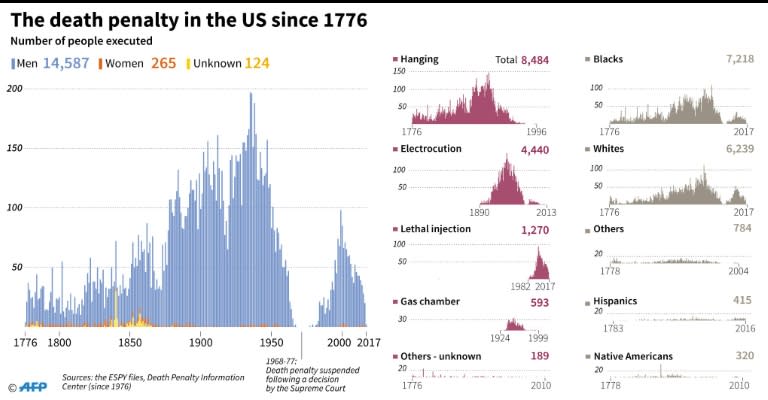Federal judge in Arkansas blocks planned series of executions
A US federal judge on Saturday blocked a series of executions planned by the state of Arkansas, as legal obstacles to the unprecedentedly intense schedule mounted and death-penalty opponents staged international protests. US Judge Kristine Baker of the Eastern District of Arkansas noted in her decision that the southern state, which originally planned to conduct eight executions between April 17 and 27, had not carried out any since 2005. She said the condemned prisoners had the right under the Eighth Amendment of the US Constitution -- which bans "cruel and unusual punishment" -- to challenge the state's plans to put them to death by lethal injection with a controversial three-drug cocktail. Her ruling covers nine inmates: six set to die this month, two who had earlier received temporary stays of execution and one whose death had yet to be scheduled. A spokesperson for state Attorney General Leslie Rutledge said Arkansas would appeal the ruling, adding, "It is unfortunate that a US district judge has chosen to side with the convicted prisoners in one of their many last-minute attempts to delay justice." The state has faced a series of legal setbacks in its plan to rush through the executions, which it said was necessary because its supply of one of the drugs used, midazolam, was about to expire. With the first executions just days away, an Arkansas circuit court judge, Wendell Griffen of Pulaski County, on Friday issued a temporary restraining order barring authorities from using vecuronium bromide as part of a lethal-injection protocol. - Misled about drug's use? - Judge Griffen said he needed time to study a request from drug distributor McKesson Corporation for the drug's use to be banned in state executions. McKesson contends that Arkansas penal authorities purchased the vecuronium bromide, which causes paralysis, without warning that it would be used to put inmates to death. The Arkansas Supreme Court had earlier granted a temporary reprieve to one of the prisoners, who suffers from mental problems. Another death-row inmate had received a similar reprieve a few days earlier. The series of legal roadblocks constitute a major setback for Arkansas's Republican governor, Asa Hutchinson, who had pushed for the accelerated executions as the expiration of the state's supply of midazolam drew near. The drugs used in lethal injections by some American states -- 19 of the 50 no longer execute prisoners -- have become increasingly difficult to obtain. Many pharmaceutical companies, particularly in Europe, ban their use for executions. While lethal injection was meant to be painless, death-penalty opponents say the risk of badly botched executions, with inmates writhing in agony for long minutes, is unacceptably high. Arkansas's plan to reduce the number of its death-row prisoners by some 20 percent in the space of a week and a half has drawn sharp protests around the world. The European Union on Wednesday urged Hutchinson to commute the death-row inmates' sentences. Amnesty International called on Arkansas to urgently halt "the conveyor belt of death which it is about to set in motion." And Human Rights Watch protested against the planned "flurry of state-sanctioned killings unseen in the modern history of the US death penalty." - 'Madness,' says John Grisham - John Grisham, the master of the legal thriller and an Arkansas native, called on his home state to stop the "madness." "An execution is the most serious act a government can undertake," he wrote in an op-ed article published by USA Today. "Why assume so many risks in the name of expediency?" The governor responded Thursday in a news conference in Little Rock, the state capital. "If I would have chosen to spread it out over four months or six months, would that have made any difference to the death-penalty opponents who are coming in here and protesting this?" he asked, in comments reported by the Arkansas Times. "I don't think so." The governor went into considerable detail about the gruesome murders behind some inmates' death sentences, saying victims' families were being forgotten. And he suggested that Arkansas should face no retaliation over his accelerated execution plan because it was hardly at the forefront of states practicing capital punishment. Since 2000, he noted, Texas had carried out 343 executions, and "Europe hasn't stopped doing business in Texas." - Continued legal battle - The battle before the courts will continue to play out in coming days, notably over the much-talked-about drug at the center of the controversy. The state's supply of midazolam expires on April 30. Critics say that midazolam, a sedative meant to render a condemned person unconscious before other drugs are used to stop the heart, does not always work. Some inmates have been left partly conscious, struggling for breath and writhing for nearly an hour before dying. Lawyers for the condemned also say that the accelerated executions could take a severe toll on the small team of penitentiary employees who carry out the death penalty, and who have not had to do so for 12 years. But Solomon Graves, a spokesman for the state penitentiary system, assured AFP that those involved "are well-trained and qualified to carry out their respective responsibilities."




